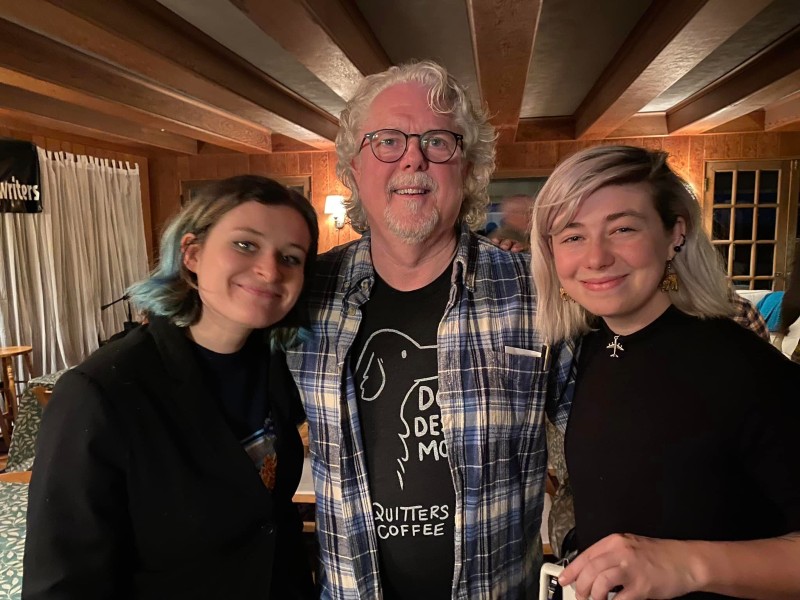"Marvin’s Room" walks a thin line between comedy and drama at Ann Arbor Civic Theatre

When the Ann Arbor Civic Theatre had to find a substitute for a previously announced play, Cassie Mann stepped in as director and suggested staging Scott McPherson’s Marvin’s Room, a play that walks that thin line between comedy and drama.
Two sisters have taken different paths in life. Bessie, now in her early 40s, left Ohio for Florida to be a caregiver for the last 20 years for her chronically ill father and an aunt confined to a wheelchair. She accepts her burden lightly but knows she’s missed a lot. Her sister Lee stayed in Ohio 20 years ago and never looked back. She is now the single mother of two teenage sons.
Bessie receives bad news from her doctor. She has leukemia and needs a bone marrow donor. Lee has to come to Florida to help her sister.
Sound heavy?
Cassie Mann calls it “one of the funniest plays about a serious subject I’ve encountered.”
Detroit’s Mike Ward Brings His Inspirational Folk Songs to AADL April 28

The state of the world weighs heavily on Mike Ward’s mind.
That concern prompted the Detroit singer-songwriter to pen a new folk song called “Why Not,” which sends an encouraging message to help others.
“When I have played it, people get how the song starts out small, gets broader as it goes on, and ends at a point where it’s up to us on a personal level,” said Ward, who’s also a University of Michigan alumnus.
“One of the things I have to work hard at is trying not to be too preachy, especially when I’m writing about things on a political level. It’s one of the areas where I try to find a balance.”
Backed by hopeful acoustic guitar and cello, he sings, “Why not do some good today with the time that we’ve got / Start with something simple / A lesson learned or to be taught / Plant a seed or lend a hand / A little helps a lot.”
“I’ve also been looking at not only how that affects the world in general, but also how it’s affecting people’s relationships,” Ward said. “It goes as broad as the country, but as narrow as some relationships and the struggles that people are having.”
“Why Not” is one of several songs Ward will be performing with Sara Gibson (cello) and Annie Bacon (vocals) at an April 28 show at the Downtown branch of the Ann Arbor District Library.
Ahead of the show, I spoke with Ward about his current state, his career transition from advertising to music, past albums, his latest songwriting efforts, his setlist for the AADL show, and plans for new material.
Double Vision: DuPont Phillips Combines Catalogs and Influences to Release New “Big Sky Sessions” EP

Ypsilanti’s Chris DuPont and Kylee Phillips decided a joint EP was long overdue.
After several years of performing and recording together, the singer-songwriters pooled their talents, catalogs, and influences to form DuPont Phillips and release Big Sky Sessions.
“This Big Sky Sessions EP was a very natural project. We used stuff that we have, and we used songs from our catalogs that have been out,” DuPont said.
“What feels good to me is that all of these interpretations of our songs that exist live now have a home. This project proved to me that putting out something doesn’t have to make you suffer. … We cut it in two days.”
During those two days at Ann Arbor’s Big Sky Recording, DuPont Phillips reimagined three tracks from prior solo releases and recorded two renditions of Sheryl Crow and Jason Isbell classics along with a new song.
“Sometimes it can be hard to explain to people what we’re doing because we’re playing things from our individual catalogs, but we’re supporting one another,” Phillips said. “For me, it’s fun to have something we can show people and say, ‘This is what it is. It’s this cross-pollination of what we both do.’”
Those collaborative efforts have resulted in an intimate folk-pop EP filled with stripped-down instrumentation, emotive duets, and lush harmonies. The six tracks featured on Big Sky Sessions offer vulnerable tales of love, growth, and change.
I recently spoke to the duo about revisiting and reworking older tracks, doing covers, recording a new song, spending time in the studio, preparing for an EP release show, and planning for the future.
Wintry Enchantment: Michael Skib Chronicles a Spiritual Quest for Truth on “This Bewitching Season” Album

For Michael Skib, winter brings a sense of enchantment.
The Ann Arbor singer-songwriter, multi-instrumentalist, and producer feels most creative during the darkest and quietest time of the year.
“It’s the best time for reflection, introspection, and creation because I’m not going to be out and about,” said Skib, who’s also half of the electronic-experimental duo Mirror Monster.
“I do find myself wanting to try and capture the melancholy that I feel because snow and darkness are beautiful. Those are the reasons why I’m drawn toward this type of music.”
That beautiful melancholy is woven throughout Skib’s latest album, This Bewitching Season, which features the hypnotic sounds of progressive rock, heavy metal, and shoegaze.
“I’m a seasonal person in the sense that there are different types of music that I listen to in different types of seasons,” he said. “I’m very sensitive to the way my environment impacts [my writing].”
Alongside those seasonal influences, Skib chronicles a spiritual quest for truth, peace, redemption, and salvation across the album’s nine tracks. His candid lyrics, ethereal vocals, and fearless instrumentation entice listeners to vicariously accompany him on his journey.
Nick Shoulders & The Okay Crawdad Takes Country Music Back to Its Roots

Nick Shoulders doesn't think the stereotypical images of country music are sexy.
“We’re living in the same world as red scares, endless wars, pandemics, and bank failures that the origins of country music identified with,” said Shoulders, who's from Fayetteville, Arkansas. “The endless wars and the scary stuff that was forming early country music is far more of the reality I inhabit. That’s what I try to channel through in my craft. I’m not doing this because it's Civil War recreation stuff or because it’s mired in an experience that’s really far away. It’s still with us.”
After going viral during the pandemic with a performance of his track, “Snakes and Waterfalls,” Shoulders has become a beloved token of the best the country/Americana genre has to offer. Having now amassed over 3 million views, the video features Shoulders in his true nature: in the middle of the forest, singing (and yodeling) on a tree stump alongside his dog.
In 2019, Shoulders released his first full-length album Okay, Crawdad after his 2018 EP, Lonely Like Me. And last year, Shoulder released his fourth record, All Bad, a live-recorded, 14-track showcase of Shoulders at his best. The record was released via Gar Hole Records, the label Shoulders founded and co-owns, and is the first album released with his former band, The Okay Crawdad, since their pandemic hiatus.
Shoulders is a staple in the current “pseudo-new wave” of Americana/country music that’s been a dominant genre for years now. But with the help of platforms like TikTok, certain songs are lassoing in fans whose only prior exposure to country music might be to the sterile, strangely sexualized tunes that dominate the top charts. But with this success, Shoulders grapples with the cultural challenges the genre faces.
Little Victories: Jim Cherewick Finds Cathartic Moments in Everyday Life on "Good News" Album

Jim Cherewick admits he recently went through a breakup.
But it’s not the kind of breakup that immediately comes to mind.
“A lot of it is about leaving that terrible retail [job],” said Cherewick, who previously worked at a big-box store. “It was such a burden—it was sad and it was scary. Getting out of that was so important and needed.”
Cherewick addresses that professional split on “Frosting on Fire,” the melancholic opener from the Ypsilanti singer-songwriter/visual artist’s latest indie-country-folk album Good News.
Backed by somber acoustic guitar and keys, he sings, “Questions stick to my bones / Like how much longer do we get another try here? / Making every single day a treasure cause I’m awake / And I won’t complain, no I won’t complain / I work at one of those stores.”
“As much as I didn’t want to write about it, I did because I wrote it during [the pandemic],” Cherewick said. “The job sucked, and it was soul-crushing. It was so bad, and then they would cut hours, and then they’d be hiring new people.”
Despite that soul-crushing experience, Cherewick finds fleeting moments of catharsis and gratitude on Good News. The album’s eight tracks reflect on the harsh realities of everyday life and yearn for an escape from drudgery, disappointment, and uncertainty.
Breakneck Speed: Mark Jewett Follows Life's Hectic Pace on "Too Fast" Single Featuring The Accidentals

These days, Mark Jewett moves at warp speed.
The Plymouth singer-songwriter maintains a frantic daily pace on his latest single, “Too Fast.”
“It was more of a general feeling of being closed in and trapped and things just coming at me faster than I could deal with them,” said Jewett about the folk-pop track, which features a collaboration with Sav Madigan and Katie Larson of The Accidentals.
“One day, I just took a break at my desk, and I picked up my guitar. I started doing this chunking rhythm like you hear at the beginning of the song. I was drinking coffee, and I thought, ‘I need some energy,’ and the line just popped into my head.”
That initial opening lyric was “I’ve got a thousand watts of black coffee / Pumpin’ through my veins,” but Jewett upped the ante to “Two thousand watts of black coffee” instead.
“Kyle Rasche caught me between shows up at Nor-East’r last year when I was in the merch barn. He said, ‘Man, that’s a great line,’ and he thought I had said something about ‘8,000 watts,’ but it was originally, ‘I’ve got a thousand watts,’” said Jewett, a University of Michigan alumnus, who started writing the track last spring. “I thought maybe there was too much there, so starting it with 2,000 [watts] just punctuates it right at the beginning.”
Love, Grief, Class, and Cancer: A.H. Kim's “Relative Strangers" reimagines a Jane Austen plot set in modern-day California

The details of who knows whom, and what happened in their pasts, result in drama in Ann Arbor author A.H. Kim’s retelling of Sense and Sensibility through her new novel, Relative Strangers, set in modern-day California.
Kim was an attorney and worked at a Fortune 200 company before retiring to write full-time. She raised her family in San Francisco, is a cancer survivor, and now lives in Ann Arbor with her husband. Kim will be in conversation with Camille Pagán at Literati Bookstore on Tuesday, April 2, at 6:30 pm.
The parallels to Jane Austen’s novel are revealed in the premise of the book.
Sonic Journey: Gastón Reggio Ventures From "Michigan" to North Carolina on New Jazz-Fusion Album

For Gastón Reggio, Michigan represents the ideal name for his second full-length album.
The Uruguayan jazz composer and multi-instrumentalist penned most of the album’s tracks while living in Ann Arbor and wanted to capture those experiences from 2019 to 2021.
“Each song has and [strives] to tell a story about things that happened during that time. Particularly, I was looking for an [album] name that worked well in English and Spanish,” said Reggio, who previously drummed with Chirp and is now based in Durham, North Carolina.
“My producer Rodrigo [Cotelo] … mentioned naming the album after the song ‘Michigan’ because it summarized my [time] here and served as the basis for some of the stories that are [sonically] told through my songs.”
On Michigan, Reggio chronicles an inspirational sonic journey filled with jazz, prog rock, and world music influences. The album starts in the Great Lakes state and whisks listeners across the Appalachians to find new musical adventures in North Carolina.
“I just let the ideas for the songs come without any restrictions, and I like to combine all of my influences to create a [personal] way to express myself through music,” he said. “I hope listeners realize the depth and honesty of this music; it’s a part of me, and if you listen to it, you will get to know me a little bit more.”
To learn more about Reggio, I recently spoke with him about growing up in Uruguay, studying music and jazz drums in Brazil, coming to Ann Arbor and joining Chirp, relocating to North Carolina, working on Michigan, and preparing for several upcoming live shows.
Everyday Monsters: Fangs and Twang Shares the Horrors and Delights of Michigan and Out-of-State Creatures on Latest Album

After years of writing about monsters, Fangs and Twang didn’t expect to find them in human form.
The country-rock trio of Billy LaLonde (drums, vocals), Andy Benes (guitar, vocals), and Joe Bertoletti (bass, vocals) discovered some people started spreading monstrous misinformation at the height of the pandemic.
In response, Benes channeled that disbelief and frustration into the Ypsilanti band’s opening track, “You Monster,” from its fourth album of the same name.
Alongside explosive electric guitar, organ, and fiddle, he sings, “It’s hard to be you and me / When we can’t tell what’s true / It seems to me that we can’t agree / Even that the sky is blue.”
“That song came to me … and it was done in 20 minutes,” Benes said. “All of the lyrics and all of the music just came out, and that was what was on my mind. [It’s about] not having a common set of facts or a common language that we’re speaking anymore as people and how horrible that is.”
The title track also lays the groundwork thematically for the horrors and delights Fangs and Twang uncovers on You Monster.


































